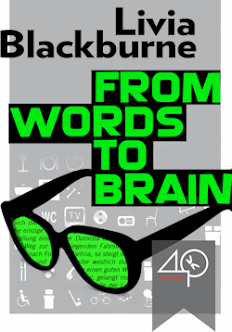 Would we write the same if we understood more about how the mind really works? If we knew that synapse would fire more readily with one word than another, would we change how we write to gain clarity or a wider audience?
Would we write the same if we understood more about how the mind really works? If we knew that synapse would fire more readily with one word than another, would we change how we write to gain clarity or a wider audience? My guest today on The Novel Road explores the many aspects of writing as it pertains to the human brain. Her website – liviablackburne.com/ is incredibly interesting. She explores the facets of writing through physiological analysis and research. Livia King Blackburne is a brain scientist: A neuroscience graduate student at M.I.T. , so yes she has more than a little academic game. What she writes carries fascinating insight into who we are, why we read and if you don’t believe her, she’ll melt your brain (just kidding…I think?)
I’m pleased to welcome author Livia King Blackburne to The Novel Road…
Me: Talk about the cognitive process. In your essay, “From Brain To Words” you mention that development starts after the last page. Are we naturally contemplative?
Livia: Well, I think it depends on the person and the book. Some books I read and forget right away, while other ones, I can't stop thinking about (and I really annoy my husband by talking about it for days on end). My guess is that this would be true for most other people too. I think the true power of a book does lie in that time period after the last page. That's when you really think it over and connect it to the real world. I mean, think about books like Uncle Tom's Cabin or the Communist Manifesto. Two very different works, but they both got people thinking, with very dramatic results.
Me: Balance between main character and supporting cast. When a secondary character grows beyond what was originally envisioned, isn’t that a quality problem?
Livia: It's definitely a warning sign that you might not be telling the story about the right person. But then, you know that as soon as I say that, people will think of 10 great literary works in which the secondary character undergoes the most growth. That's the problem (or beauty) of writing as art. You can draw generalizations, but there are always exceptions.
Me: When you talk about how our brain frames events as stories, are you talking about recall or the level of detail each person decides as important to convey an event?
Livia: I first heard this idea from Tom Stafford in his essay The Narrative Escape. I'm talking about the structure that a person gives an event. Our brains like to make sense of things. We assign causality, motivation, and meaning to things that happened, and we have expectations for how things should turn out, given what has already happened.
This has implications both for the way we see our lives and for the way we act. For example, ask someone about their life story, and they will most likely structure it as (surprise, surprise) a story, a moving narrative where past events influence future events. Tom Stafford focuses more on how our story mindset might make us act without thinking and do what's expected of us because that's the way things work. While this makes life easier, this also causes us to miss many opportunities, and sometimes results in tragedies when bad things are happening but people don't take a stand. Tom explains it more eloquently in this interview http://www.40kbooks.com/?p=2176
 |
| picture courtesy of web.mit.edu |
Me: Talk about how the mind interprets Point of View and narrative distance.
Livia: We are social animals, so our brains are wired to interact with other people. We are equipped with many tools to figure out what other people are thinking and feeling. Some of these tools include facial expressions, body language, our understanding of the situation, etc. As writers then, our job is to replicate these cues so the reader knows what the characters are thinking and feeling. It's an interesting way to look at the “show don't tell” rule -- you could frame it instead as saying that a writer should use natural emotion cues rather than just telling the reader that little Johnny is sad.
One particularly challenging social task is figuring out what someone else is thinking when it's different from what you are thinking. For example, if someone stole your friend’s lunch while he wasn't looking, you know that the lunch is no longer in his lunch box, but your friend doesn't. Somehow, your brain has to keep those two ideas separate. It seems very easy now, but actually, children have a hard time with this type of task. And as a writer, I sometimes have trouble with more subtle variations on this. For example, if I'm not careful, my main character will start reacting to situations in ways that are more characteristic of my personality than hers.
Me: In a number of my literary agent interviews, each has pointed to an increasing importance of a strong narrative voice. Any thoughts on narrative voice as it pertains to your field of expertise?
Livia: I took an introductory linguistics class during my early years as a grad student, and one interesting thing we learned was how everyone has their own unique dialect. We usually think about dialects as something shared by people of a certain region, but each individual person also has his own way of speaking, his preferred phrases and grammatical structures. On top of that, add a worldview, a past, and how that affects the way you see the world. Put it all together, and you have a strong narrative voice. Piece of cake, right?
 Me: Talk about your incredibly interesting “From Words To Brain” essay. Out of all the literature to choose from, you chose “Little Red Riding Hood. Why?
Me: Talk about your incredibly interesting “From Words To Brain” essay. Out of all the literature to choose from, you chose “Little Red Riding Hood. Why?Livia: Reading is interesting in that it's so automatic, yet so complex. There are so many brain processes involved, from the decoding of symbol on the page, to seeing the images that words describe, to understanding and identifying with the characters in the story. In the essay, I take the reader on a tour of the brain, following the words on the page through different levels to see what happens.
I use Little Red Riding Hood as a concrete example -- for one thing, because I like fairy tales. But also, it's a complex story. There are layers to it, and characters and situations aren't always as they appear. This made it a good example for my purposes.
Me: Is the current popularity of Dystopia novels tied to a variation of schadenfreude?
Livia: Your guess is as good as mine. Perhaps it's because people are really worried about the way the world is going now, and dystopian fiction is a way to convince ourselves that even if everything falls apart, life still goes on.
Me: Publishing is going through an evolution at the moment. How has this or will this affect you?
Livia: This has affected me quite a bit. For one thing, I wouldn't have been able to put out my essay if it weren't for these changes in publishing. The publisher, 40K books, found me through my blog (so yes, platform works, at least for nonfiction authors). Also, the format of my essay makes it something that can only exist in a digital form. It's about 7000 words, so it's not long enough to sell as a book. But e-books aren’t limited by artificial word or page counts, so I could present the idea at its natural length.
 |
| image courtesy of ska4christ.com |
Me: You get to have lunch with any author you which, from throughout history or today, and why?
Livia: I'd say Paul of Tarsus. Probably one of the most influential authors ever. I'd love to pick his brain about theology.
Me: Life experience in the writing process. What advice can you give writers on its importance?
Livia: It's incredibly important. As proof, I could simply post some of the stuff that I wrote 10 years ago as a sheltered highschooler, but that would be too embarrassing. We’re writers. We bring entire worlds to life. To make it believable, and really to have something worthwhile to say, we need to understand people -- both at an individual level and at the level of societies and states.
 Me: Your website, A Brain Scientist’s Take On Writing, is incredibly interesting. You explain the neuro-scientific aspects of writing. How has this enhanced your insights into the human mind as well as your own writing?
Me: Your website, A Brain Scientist’s Take On Writing, is incredibly interesting. You explain the neuro-scientific aspects of writing. How has this enhanced your insights into the human mind as well as your own writing? Livia: Well, I started a blog as a way to improve my own writing. I figured if I forced myself to write about craft, I would probably end up learning something. And I've used quite a few of the techniques that I've written about. For example, I use the techniques on grabbing people's attention from Made to Stick (http://blog.liviablackburne.com/2010/05/how-to-get-and-keep-peoples-attention.html) in my nonfiction. Also, I try to emulate Suzanne Collins’ character building from The Hunger Games (http://blog.liviablackburne.com/2010/04/loading-first-impression-for-quick.html).
Me: Can you tell us about your next book?
 |
| Tamora Pierce courtesy of mla.lib.mi.us |
Livia: I have to decide what it is first :-) I'm polishing up a young adult fantasy novel -- a medieval fantasy in the tradition of Tamora Pierce or Kristin Cashore. For nonfiction, I'm still trying to decide between expanding From Words to Brain into a full-length book or working on some shorter creative nonfiction type stuff. I'm pretty excited about the developments in digital publishing and self-publishing, so it's possible that I may go that route. I’m still weighing the pros and cons.
Authors think and dream. We write what comes to us, filling line after line and page after page until what was in our minds rests before us in print.
*************************************
I'd like to thank Livia for her valuable time spent doing this interview and wish her all the best in her writing and research. Maybe she'll want me to leave my brain to science? I'm told my single digit I.Q. makes me special...

No comments:
Post a Comment